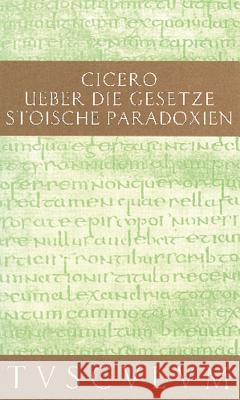De legibus / Über die Gesetze » książka
De legibus / Über die Gesetze
ISBN-13: 9783050054575 / Niemiecki / Twarda / 2011 / 328 str.
Since 1923 the Sammlung Tusculum has published authoritative editions of Greek and Latin works together with a German translation. The original texts are comprehensively annotated, and feature an introductory chapter. In the new volumes, additional essays delve into specific aspects of the works, illuminating their historical context and reception to the present day. The high academic quality of the new editions together with clearly written essays and annotations make the Sammlung Tusculum essential reading for students who are discovering an ancient author for the first time as well as professional scholars who would like to gain a deeper understanding of specific aspects of a given work. Moreover, the series is ideal for lay readers who would like to engage with antiquity through a reliable German translation. The series contains over 270 titles, available in print and eBook editions, making previously out-of-print titles and rarities available again for the first time. In order to celebrate the 90th anniversary of the series, De Gruyter is proud to present Tusculum Online, an eBook package which contains all titles that appeared between 1923 and 2013 - a fitting tribute to an important part of German publishing history. For more information, please see www.degruyter.com/tusculum
Nach dem Vorbild Platons faßte Cicero den Plan, seiner Schrift "De re publica" eine Abhandlung über die Gesetze folgen zu lassen. Der Dialog "De legibus" wird von Marcus Cicero, Atticus und Quintus Cicero, dem Bruder des Politikers, in heiter-entspannter Atmosphäre auf seinem Landgut in Arpinum geführt. Es handelt sich um drei Bücher über rechtsphilosophische Grundfragen, die in einer kommentierenden Darstellung der Sakralgesetzgebung und des Zivilrechts veranschaulicht werden. Die 52/52 v. Chr. Entstandene Schrift beweist Ciceros Fähigkeit, ein schwieriges und auf den ersten Blick sprädes Thema faszinierend darzustellen. Das gilt auch für die "Paradoxa Stoicorum", die Cicero Anfang 46 v. Chr. verfaßt und seinem Freund Brutus gewidmet hat. Mit Hilfe geschichtlicher und biographischer Beispiele ist es dem Autor gelungen, seine Leser auf anregende Weise für die Dogmen der stoischen Ethik zu interessieren.











